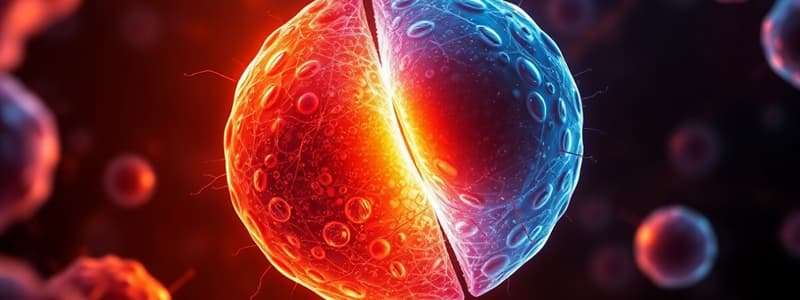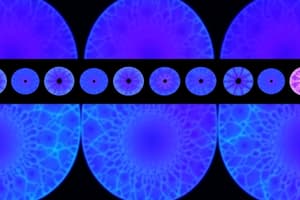Podcast
Questions and Answers
What is the primary role of muscle cells in an organism?
What is the primary role of muscle cells in an organism?
Which process describes how cells communicate and coordinate their functions?
Which process describes how cells communicate and coordinate their functions?
What can influence the expression of specific genes in cells?
What can influence the expression of specific genes in cells?
Which of the following mechanisms is NOT used for cell communication?
Which of the following mechanisms is NOT used for cell communication?
Signup and view all the answers
What is often linked to dysregulation of cell communication?
What is often linked to dysregulation of cell communication?
Signup and view all the answers
What is the primary purpose of mitosis in somatic cells?
What is the primary purpose of mitosis in somatic cells?
Signup and view all the answers
Which organelle is primarily responsible for producing ATP through cellular respiration?
Which organelle is primarily responsible for producing ATP through cellular respiration?
Signup and view all the answers
Which stage occurs first during mitosis?
Which stage occurs first during mitosis?
Signup and view all the answers
In which type of cell division are four haploid daughter cells produced?
In which type of cell division are four haploid daughter cells produced?
Signup and view all the answers
What is the primary function of the ribosomes within the cell?
What is the primary function of the ribosomes within the cell?
Signup and view all the answers
Which statement best describes catabolism within cell metabolism?
Which statement best describes catabolism within cell metabolism?
Signup and view all the answers
What role does the Golgi apparatus play in the cell?
What role does the Golgi apparatus play in the cell?
Signup and view all the answers
What is a key aspect of cell cycle regulation to prevent uncontrolled cell division?
What is a key aspect of cell cycle regulation to prevent uncontrolled cell division?
Signup and view all the answers
Study Notes
Introduction to Cell Biology
- Cell biology is the study of cells – their structure, function, and interactions.
- It encompasses a wide range of topics from the molecular mechanisms within cells, to their roles in tissues and organisms as a whole.
- Understanding cell biology is critical for comprehending many biological processes, including disease, development, and evolution.
Cell Division
- Cell division is the process by which a single cell replicates itself to create two or more daughter cells.
- There are two main types: mitosis and meiosis.
- Mitosis is used for growth, repair, and asexual reproduction in somatic cells (body cells).
- Meiosis is used for sexual reproduction and generates gametes (sperm and egg).
- Key stages of mitosis include prophase, metaphase, anaphase, and telophase, each with specific molecular events.
- Meiosis has two rounds of division, producing four haploid daughter cells.
- Cell cycle regulation is essential to prevent uncontrolled cell division, which is a key aspect in cancer development.
- This regulation involves checkpoints and signaling molecules that ensure accurate DNA replication and distribution.
Cell Metabolism
- Cell metabolism encompasses all biochemical processes within a cell, including those that build up molecules (anabolism) and those that break them down (catabolism).
- It involves the harnessing of energy from nutrients to power cellular activities.
- Cellular respiration is a crucial catabolic pathway that breaks down glucose to produce ATP, the cell's primary energy currency.
- Anabolic pathways use energy to synthesize complex molecules, such as proteins, lipids, and nucleic acids.
- Metabolic pathways are highly regulated to maintain cellular homeostasis.
Cell Structure
- Cells have a variety of internal structures, or organelles, each with a specific role.
- The nucleus houses the cell's genetic material (DNA).
- Mitochondria are the "powerhouses" of the cell, performing cellular respiration.
- Endoplasmic reticulum (ER) is involved in protein and lipid synthesis.
- Golgi apparatus modifies, sorts, and packages proteins.
- Lysosomes are involved in waste disposal.
- Vacuoles help maintain water balance and storage.
- Ribosomes are responsible for protein synthesis.
- Cytoskeleton provides structure and support.
- Cell membrane regulates what enters and exits the cell.
- Different cell types have specialized structures tailored to their functions.
Cell Function
- Cell function refers to the role a specific cell type plays in an organism.
- Muscle cells are responsible for movement.
- Nerve cells transmit signals throughout the body.
- Red blood cells carry oxygen throughout the body.
- Different cell types can communicate and coordinate their function.
- Cell function depends on the expression of specific genes. In turn, this is often influenced by external factors.
Cell Communication
- Cell signaling is the process by which cells communicate with one another.
- This enables coordinated responses to external stimuli and internal events.
- Communication can be between neighboring cells or between cells spread throughout the body.
- Cells communicate through various mechanisms, including direct contact, local signaling, and long-distance signaling.
- These signaling pathways often involve receptors, second messengers, and intracellular signaling molecules that trigger specific responses within the receiving cell.
- Dysregulation of cell communication is often linked to diseases such as cancer and diabetes.
Studying That Suits You
Use AI to generate personalized quizzes and flashcards to suit your learning preferences.
Description
Explore the fundamentals of cell biology, including the structure and function of cells. Learn about the critical processes of cell division such as mitosis and meiosis, and understand their significance in growth and reproduction. This quiz covers essential concepts and key stages of the cell cycle.




